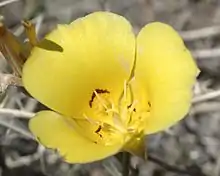Calochortus aureus
Calochortus aureus is a North American species of flowering plants in the lily family.[2][3] It is native to the southwestern United States (Arizona, southern Utah, northwestern New Mexico and southwestern Colorado).[1][4] n Calochortus aureus is a bulb-forming perennial herb producing a single stalk up to 30 cm tall. Flowers are bright lemon-yellow with red or purple splotches on the petals.[5]
| Calochortus aureus | |
|---|---|
 | |
| Near Crystal Forest site in Petrified Forest National Park, Arizona | |
| Scientific classification | |
| Kingdom: | Plantae |
| Clade: | Tracheophytes |
| Clade: | Angiosperms |
| Clade: | Monocots |
| Order: | Liliales |
| Family: | Liliaceae |
| Genus: | Calochortus |
| Species: | C. aureus |
| Binomial name | |
| Calochortus aureus | |
| Synonyms[1] | |
| |
History
Calochortus aureus was published by Sereno Watson in 1873,[6] based on material collected by Ellen Powell Thompson in 1872 in the vicinity of Kanab, Utah, during the US Topographical and Geological Survey of the Colorado River (led by John Wesley Powell). Her specimen is deposited at the United States National Herbarium (US). It was later reclassified as Calochortus nuttallii var. aureus by Ownbey, but is now recognized as a full species, as originally described.[7]
References
- Kew World Checklist of Selected Plant Families
- Tropicos, Calochortus aureus S.Wats.
- Watson, Sereno 1873. American Naturalist 7(5): 303
- Biota of North America Program 2014 county distribution map
- Flora of North America Vol. 26 Page 137 Calochortus aureus Baker
- Watson, S. 1873. New plants of northern Arizona and the region adjacent. Amer. Naturalist 7 (see page 303). Available through the Biodiversity Heritage Library.
- Welsh, SL. 1982. Utah plant types—historical perspective 1840 to 1981—annotated list, and bibliography. Great Basin Naturalist 42:129-189 (see page 162). Available through the Biodiversity Heritage Library
External links
 Media related to Calochortus aureus at Wikimedia Commons
Media related to Calochortus aureus at Wikimedia Commons- Pacific Bulb Society, Calochortus Species One
- Plants for a Future, Calochortus aureus - S.Watson